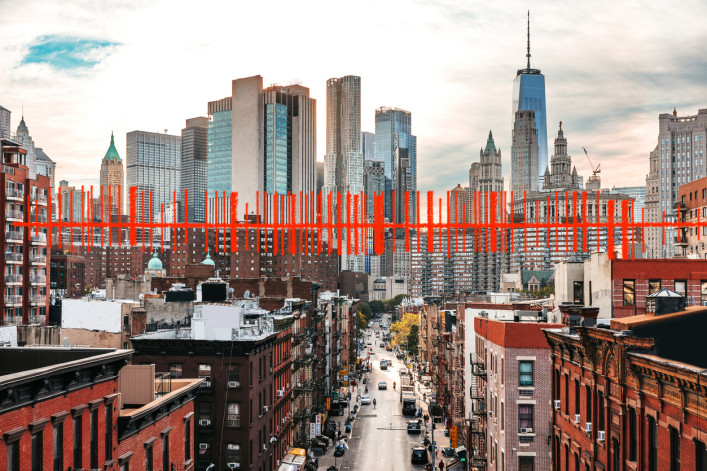Do New Yorkers need earthquake insurance?
- Earthquake insurance is a supplemental policy that kicks in after building damage exceeds your deductible
- Deductibles range from 2 to 20 percent of your building's value, depending on location, age, and condition

The recent quake in New Jersey that rattled NYC should be a wake-up call to learn about the insurance coverage your building has and what it may be missing, our experts said.
iStock
I never really thought about an earthquake happening in the NYC area, so the recent quake in New Jersey shook me up for multiple reasons! What do New Yorkers need for earthquake insurance?
Major earthquakes are rare for New York City, but small ones do occur and some researchers think NYC is due for a magnitude 5 or higher. It’s important to know that earthquakes are not covered by standard insurance policies. For that reason, the recent quake in New Jersey that rattled NYC should be a wake-up call to learn about your building's insurance coverage and what may be missing, our experts said.
Earthquake insurance covers damage from shaking and cracking and coverage is usually done as a supplemental policy that kicks in after damage to a building exceeds your policy’s deductible.
These policies often have high deductibles, said Loretta L. Worters, vice president of media relations for the Insurance Information Institute. She said deductibles range from 2 percent to as high as 20 percent of the value of your building, depending on its location, age, and condition.
A property may have to be inspected and upgraded before qualifying for earthquake insurance, for example, the structure may need to be bolted to its foundation, chimneys and walls braced, or other improvements.
Unreinforced masonry buildings are most vulnerable
Worters pointed to a 2003 report from The New York City Area Consortium for Earthquake Loss Mitigation that said unreinforced masonry buildings, which are predominant in NYC, are the most vulnerable to an earthquake because the material is brittle and does not absorb motion, making the walls likely to collapse out (among the many fearsome scenarios outlined).
NYC has some of the toughest building codes in the country, but there are also older buildings that went up before the codes were enacted. If you live in a building that went up in the late 1800s and has not undergone a major renovation, it can be vulnerable.
Co-op and condo boards should read their policies
The recent earthquake is a reminder for co-op and condo boards to read their master insurance policies, said Philip Maltaghati, co-CEO of United Public Adjusters & Appraisers, which helps buildings file insurance claims.
Most New Yorkers are not very familiar or don’t understand insurance terminology and most apartment buildings are “grossly under-insured,” he said.
“Conversations about earthquake insurance should be happening without a doubt,” he told Brick. And they should be part of a larger discussion about how NYC residential buildings can be protected when significant damage occurs.
Following the earthquake, Maltaghati did a random survey of some New York building insurance policies. He found a wide range of coverage and deductibles, and even where there was additional coverage for earthquakes, it was not adequate.
He said that one Manhattan condo building had a master policy with a $100,000 deductible for earthquakes under the "earth movement" category, without explicitly excluding earthquake damages—meaning owners would have to eat the cost of the first $100,000 for damaged property.
He also found policies for co-op buildings with earthquake coverage that had significant deductibles relative to the properties’ value.
At the same time, NYC buildings are grappling with rising premiums, so a higher premium or deductible is not an easy case to make to a board.
Another area where cutting costs can hurt: Maltaghati pointed out that many management companies don’t hire risk managers who can spot gaps in insurance coverage. “It’s expensive,” he said.
Code upgrade and replacement cost coverage
Here are some solutions that he highly recommends to condo and co-op boards:
Maltaghati recommends buildings have ordinance or law coverage, also known as code upgrade coverage. This pays for expenses that occur when you have to bring your building up to code after a claim.
He also recommends buildings have replacement cost coverage to reimburse the cost of rebuilding “if God forbid something terrible happens.”
If you don’t know how to determine the replacement value of your building, he said to hire an experienced commercial appraiser—that may set you back $10,000 or more—then give that cost to the insurance broker.
“You want to be able to say, ‘we did an appraisal and it said we should be insured for this amount,’” he said.
His firm will review your building’s insurance policy for free to identify gaps in coverage, he added.
What property owners can do about insurance
Your concern can be put to good use if it prompts you to investigate what sort of insurance coverage you have, said Dawn David, a broker at Corcoran. Even though the earthquake shook up a lot of New Yorkers, “many have already forgotten about it,” she said.
“When you’re living in NYC, you’re not thinking about earthquakes the way Californians do,” she said.
Standard owners and renters insurance policies do not cover earthquake damage, as this Forbes article explains. One exception is if there is a fire sparked by an earthquake, your policy will cover fire-related damage.
David said another event changed her approach to insurance.
When she was part of the management team for a condo building, a flood occurred in one of the units. That prompted her to start collecting insurance information from other unit owners to make sure that owners were adequately insured as required by the building.
She found out something interesting: Owners who live in their apartments were carrying more coverage for personal items compared to owners who used their units as a pied-à-terre or rented them out—a curious approach since leaks and fires can happen whether you’re in town or not.
To keep track of owners and renters’ insurance documents, she uses BuildingLink’s property management portal, which last year added an insurance compliance module. Residents can use the site to submit their policy information to management for approval, and management can keep track of when a policy is going to expire, for example.
Trouble at home? Get your NYC apartment-dweller questions answered by an expert. Send your questions to experts@brickunderground.com.
You Might Also Like






























